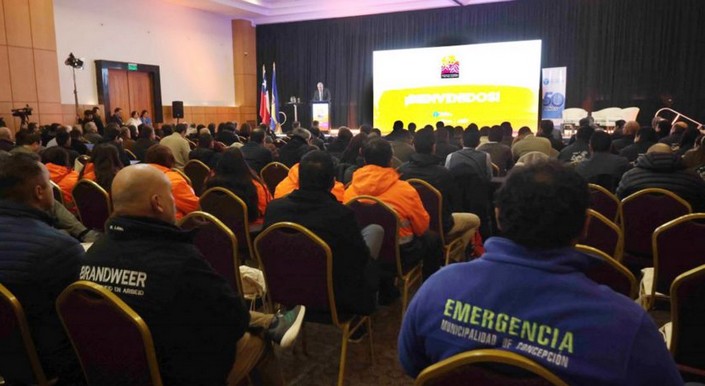- Representatives from various public and private institutions gathered to participate in the event, which features experts from countries such as the United States, South Africa, France, and Spain.
The high rates and damages caused by wildfires in the south-central region of the country are an issue that gains increasing prominence each year on the state agenda, as well as in the private sector and academia.
That is why this Tuesday, the SurActivo Event Center hosted the first day of the "International Conference: Wildfire Management and Human Factor," an event organized by the Ergonomics Department of the University of Concepción.
With one of its halls at full capacity, various stakeholders from the public and private sectors of the regional sphere exchanged experiences to consolidate a roadmap for an issue as critical as wildfires in the Biobío Region, which leads wildfire records since 1977 with a total of 99,495 incidents, far ahead of La Araucanía with 42,929, as reported by the UDD Faro Regional Bulletin, "Wildfires and Human Causes: A Serious Problem."
In this regard, the Rector of the University of Concepción, Dr. Carlos Saavedra Rubilar, stated, "This meeting raises major challenges. The question is whether, based on this experience, this learning, and the discussions held here, we can build—from regional capacities—a structure that allows us to address wildfire management, as well as natural disasters in general terms," while highlighting the university’s role in fostering connections through such activities.
Meanwhile, the Regional Governor of Biobío, Rodrigo Díaz Wörner, emphasized the importance of preparing as a region to face this recurring risk year after year, while underscoring how the knowledge present at the University of Concepción can provide people with adequate information, "so that the different parties with responsibilities in addressing these risks can come together more effectively and, above all, because this is a deeply necessary activity to protect people's lives, their property, and the ecosystem."
Dr. Felipe Meyer Cohen, Director of the Ergonomics Department at the Faculty of Biological Sciences of the University of Concepción, when asked about the emphasis on the human factor in the event, explained that the department began studying forest firefighters 25 years ago and that, just as wildfires have evolved, so have the people who combat them.
"Seasons are longer; the temporary worker of the past may now become more permanent. There are other physical, psychological, and medical conditions that must also be evaluated in firefighters. I believe it was time to sit down and discuss this fundamental factor: the people," he noted.
Key Stakeholders
The National Disaster Prevention and Response Service (Senapred) was one of the participating institutions in the event, which concludes this Wednesday, July 24. Its director, Alejandro Sandoval Kirkwood, stated that it is important to assess the previous season, learn lessons, identify gaps, and explore improvement opportunities for the upcoming season.
"Wildfire seasons are now extending to nearly eight months. The most significant fire of the last season occurred in August 2023. Therefore, this is ongoing work, and we appreciate, in this case, the University of Concepción for including us to share our message regarding the roles and functions of the different members of the system," he declared.
Similarly, Rodrigo Jara Ortega, Regional Director of the National Forestry Corporation (Conaf), explained that the International Conference is extremely important because, although his institution’s role at the regional level is wildfire prevention and suppression, there is also a key focus they must address: their firefighters.
"Focusing and emphasizing the human factor is essential because it is an extremely complex and stressful job... We must properly address this issue, meet the needs of our firefighters, and have these spaces, which are not common," he said, also thanking the University of Concepción for inviting all stakeholders involved in wildfire prevention.
Finally, Ramón Figueroa Lizana, President of the Forest Protection Department of the Chilean Wood Corporation (Corma), stressed that the human factor is as important as the causes of wildfires, especially after a "fairly positive" season, like the last one in the Southern Macrozone, "perhaps we all let our guard down and thought the work was done, that the next season would be equally positive; the truth is that the next season will be very different—unfortunately, there won’t be much more rain, and we’re heading into a summer with the La Niña phenomenon, which is quite unpredictable," he concluded.
Source:diarioconcepcion.cl







Comentarios (0)
No hay comentarios aún. ¡Sé el primero en comentar!
Deja un comentario